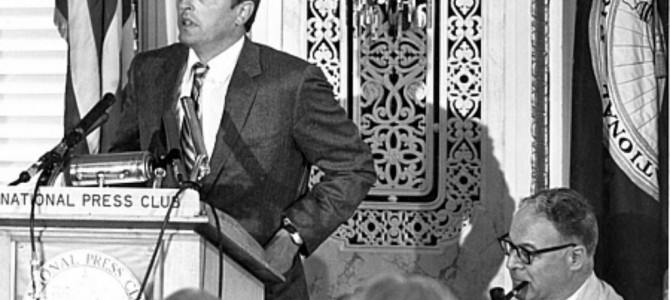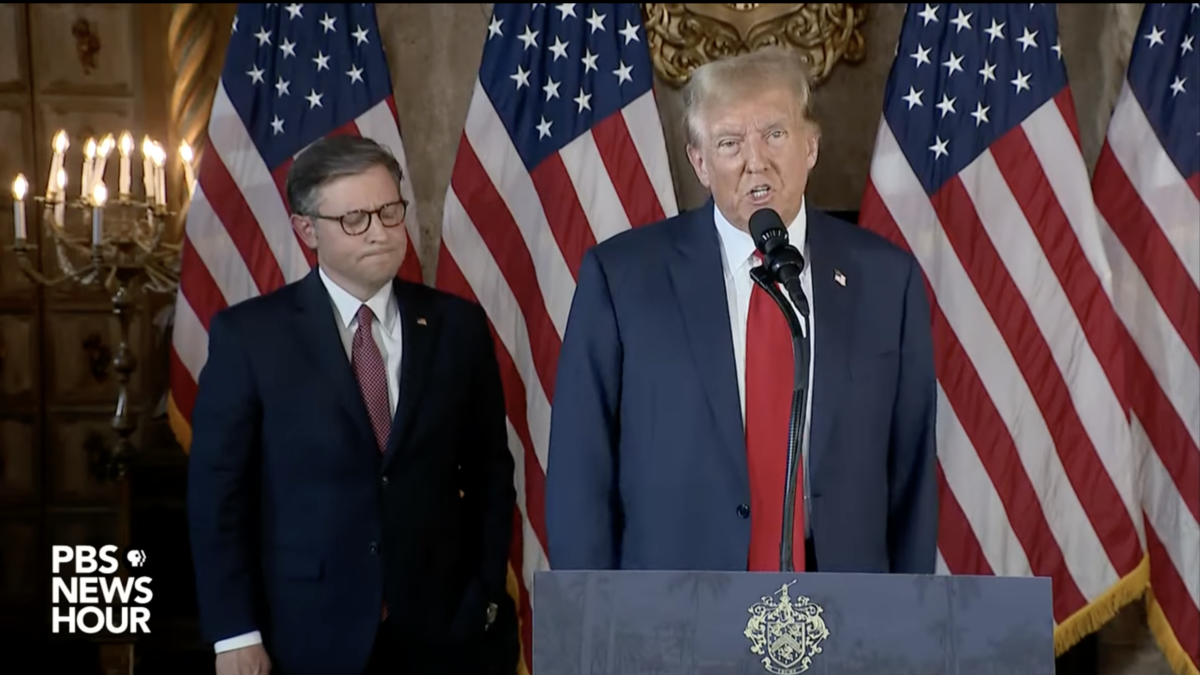
An outspoken and polarizing New York celebrity, who’s a bestselling author and familiar TV presence, decides to run for office even though he has no previous political experience. He’s famously contemptuous of political insiders, a seemingly contradictory stance considering he has an elite education and hails from a wealthy and well-connected family. His campaign ends up having significant impact on the national political conversation, in spite of the fact both the Republican and Democratic establishments are in agreement that his politics are too reactionary for him to actually win.
Sound familiar? Well, just forget about Donald Trump for a bit. For those looking to add some illuminating context to debates and personalities roiling the GOP presidential primary, there’s been a bit of a William F. Buckley boomlet this year. So far, there’s been a book on his relationship with Norman Mailer, and a documentary covering his 1968 convention debates with Gore Vidal. But given that 2016 is turning out to be an election shaped by political outsiders, it’s Encounter Books’ re-release of Buckley’s The Unmaking of a Mayor that is most worth revisiting.
The book is an account of Buckley’s run for mayor of New York City in 1965, that reads as if it’s part Up From Liberalism, and part Cruising Speed. The major party candidates were the Republican John Lindsay—then considered an emerging star of the Republican party, and the Democrat Abe Beame who, if he had been elected, would have been the first Jewish mayor of New York. Buckley led the Conservative party ticket less than a year after Goldwater had been routed.
As a literary endeavor, this is peak Buckley—the arguments here are sharply made and there’s a Tom Wolfe exuberance to the prose that is absent from his later writing. It’s the WFB present in The Unmaking of a Mayor that gives the lie to the contemporary liberal conceit that Buckley is a “good conservative” to counterbalance their disdain for contemporary conservatives. The truth is Buckley is only praised now because to do so after his death carries little risk. As the tale of his ill-fated mayoral campaign amply demonstrates, Buckley was often and strenuously deplored as a “bad conservative” when he was a living and breathing man at the height of his powers.
The Rise of Goo-Gooism
As you would expect from the premise—William F. Buckley running for public office!—the book is great fun all the way into its footnotes. Buckley breaks all the campaign rules and conducts the kind of authentic, daring campaign that Donald Trump might run if Trump had style, wit, and a keen political intelligence. After announcing his candidacy, he’s asked whether he wants to be mayor and replies, “I’ve never considered it.” After meeting with the editors of the New York Times he’s asked what he would do if he won and quips, “hang a net outside the editor’s window.” He reacts to his opponent’s plan by observing “Mr. Lindsay has tried to construct 10 points for the economic rejuvenation of New York by the simple expedient of numbering ten paragraphs of emptiness (1) through (10) consecutively.”
It’s the “glamorous” Lindsay that is the target of most of Buckley’s wit, because he sees him both as an interloper—tellingly, Lindsay would later become a Democrat—and as something of an empty suit. (The Manhattan Institute’s Fred Siegel would later rank Lindsay at the bottom of New York’s mayors.) In contrast, Buckley’s dynamic with the Democratic Beame is more poignant than critical.
The larger argument Buckley makes in the book is against “goo-gooism,” a non-ideological reform movement against corrupt government, succinctly captured by Mayor La Guardia shrugging off questions about his economic and social views with the response “the only question is honest and efficient administration.” Here we are on to something that explains, at least in part, the current appeal of honest, dignified Ben Carson, and dealmaker, effective business administrator Donald Trump. On the surface they may seem to be quite different candidates in tone, but both embrace an overly-simple and managerial approach to politics that makes bold promises that will be difficult to follow through on. That makes them both candidates of goo-gooism.
Against this, Buckley argued in ’65—and presumably would do so now—that the problem wasn’t the quality of the candidates, but rather “a frozen ideology.” In a larger sense it was the Zeitgeist, a word many readers probably first encountered reading Buckley. It is a point which conservatives both understand and tend to lose sight of. Is it realistic, for instance, in the face of grossly unconstitutional legislation to expect the Supreme Court to stand athwart “the Zeitgeist which, because its path, like a tornado’s is set, has perforce to be accommodated by practical men,” as Buckley describes the problem here? (If you’ve been following the Roberts court, the answer is a resounding “No.”) Is an emphasis on original intent going to convince in an age that believes the world began “in nineteen sixty-three” if not later?
Ahead of His Time
By 1965, Buckley had already noticed that goo-gooism had a fundamental defect. “New York is reaching the point where it faces the marginal disutility of bloc satisfaction. The race to satisfy the bloc finally ends in dissatisfying even the individual members of the same bloc” and that “in the end we are all just treated as categories.” It’s a point he makes more poetically elsewhere, observing that soon “the skies are dark with crisscrossing dollars” and that “any time a Cayugan sends a dollar down to New York, it is going to stop in Albany for an expensive night on the town.” As for the current concern that corrupt political elites are exploiting their undeserved status to loot the country, in Unmaking Buckley definitively states that for the conservative the object is the “dismantling, rather than establishing, artificial privileges.”
Another defining idea of the age that Buckley takes on is the notion that social environment always takes precedence over other political concerns. Buckley’s contrasting proposals were influenced by the social science work of nascent neoconservatives such as Nathan Glazer and Daniel Patrick Moynihan. He also echoes a point made by English political theorist Bernard Bosanquet who noted “the zeal of the advocate [for social reform] has led him to slander his client.” For example, Buckley makes the sharp observation that minority leaders who support laws weakening the ability of the police to enforce the law also run the risk of hurting the same minorities who are the principal victims of crime.
The reaction to Buckley running for mayor and articulating sophisticated policy approaches way ahead of their time is pretty much what you’d expect. The columnist Joseph Kraft said of Buckley, “The Conservative candidate came right out in the open on crime in the streets, drug addiction, protest demonstrations and all the other code words for race prejudice.” And in the same vein, the baseball great, then activist Jackie Robinson comments to Buckley, “Your speech as I see it is cleverly written to appeal to all the prejudices that were just below the surface in the last [Goldwater] campaign.”
Like Uber, But For Political Candidates
Indeed, what makes The Unmaking of a Mayor such a great read today is that everything is so recognizable. In 1966 it’s an entertaining, provocative book on a campaign. Today it reads like a description of the immutable laws of modern politics. It seems timeless in ways more reminiscent of Democracy in America than Teddy White’s The Making of the President books that Buckley mocks in the title.
Case in point, the Buckley position papers are waived away by Abe Beame—who Buckley seems to genuinely like and respect—with “I believe that 20th Century New Yorkers are anxious for 20th Century solutions to our problems.” What is this, but a variant of Obama’s “right side of history” argument? It’s a dismissal made all the more piquant in this case because Buckley’s traffic solution neatly anticipates Uber—“anybody without a police record may operate a car as a taxi.” But there are times when you you could say that Beame was technically on the right side of history. It is rather amusing to see Buckley refer to vegetarians not once, but twice, as kooks.
As to the main actors, the names have changed but that’s it. At the risk of sounding obsessed, no current figure is seemingly alluded to in this book more than Barack Obama. As a charismatic empty suit adored by the media, it’s not hard to see Lindsay as an Obama precursor. “One metropolitan newspaper has carefully and enthusiastically recorded his attributes, the most significant of which, some observers have noted, is the brilliance of his teeth. [Yes, that was a qualification solemnly remarked by one major newspaper.]” Are brilliant teeth a better or worse criteria for high office than New York Times columnist David Brooks’ famous fawning over Obama’s sharp pants crease? The columnist, Murray Kempton, writing of Lindsay and the voters had this to say: “He has pressed no claim on reason…which suggests that he would be a good mayor. But what a splendid fellow he otherwise is. Just as a man he is magnificent and that is enough in a candidate to convey illusions.”
Predictably enough, Kempton would later turn critical of Lindsay when his obvious shortcomings became, well, even more obvious. It’s a shame that in 1965, New Yorkers turned toward a candidate who conveyed illusions rather than one such as Buckley who could convey truths, and do it so adroitly. Fifty years later, and given his newfound status as a “good conservative,” we can only hope that 2016 is the year where the chastened voters in Obama’s America and De Blasio’s New York reconsider the wisdom contained in The Unmaking of a Mayor.









